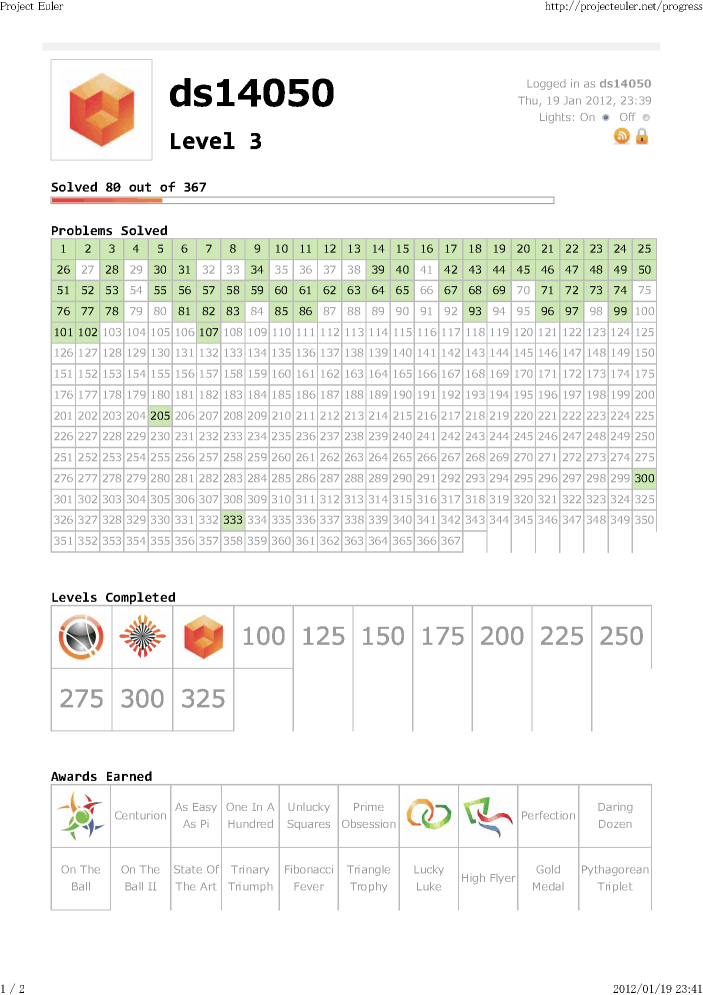2012年01月19日 (木)
最終更新: 2012-01-20T00:09+0900
♪ [ProjectEuler] Problem 10, 12, 14, 17, 19, 21, 23
穴埋め。解ける問題がはやなくなってきたから……(完全になくなってはいないはずっ)。
Problem 10
時間コストを空間コストに置き換えて。
arr = [true] * 2_000_000
sum = 0
2.upto(arr.size-1){|i|
next unless arr[i]
sum += i
i.step(arr.size-1, i){|j|
arr[j] = false
}
}
p sum
p Process.times
Problem 12
Rubyに頼った。prime_divisionのこと。
require 'mathn'
trinums = lambda{
tri, n = 0, 1
return lambda{
tri, n = tri+n, n+1
return tri
}
}.call
loop{
tri = trinums.call
div = tri.prime_division.inject(1){|d,_| f,e = *_; d*(e+1) }
if 500 < div
puts tri
p Process.times
exit
end
}
Problem 14
ゴールから攻めようとか小賢しいことは考えずに。
number_of_chain = lambda{
memo = {1=>1}
this = lambda{|n|
return memo[n] || (memo[n] = 1 + this[n%2==0 ? n/2 : 3*n+1])
}
return this
}.call
p (1...1_000_000).max_by{|_| number_of_chain[_] }
p Process.times
Problem 17
面倒なだけ。
cc = lambda{
return this = lambda{|n|
count, num = 0, n
digit1000 = num / 1000
if 0 < digit1000
count += this[digit1000] + 'thausand'.length
num -= digit1000 * 1000
count += 'and'.length if num != 0
end
digit100 = num / 100
if 0 < digit100
count += this[digit100] + 'hundred'.length
num -= digit100 * 100
count += 'and'.length if num != 0
end
digit10 = num / 10
if 2 <= digit10
count += {
20=>'twenty'.length,
30=>'thirty'.length,
40=>'forty'.length,
50=>'fifty'.length,
60=>'sixty'.length,
70=>'seventy'.length,
80=>'eighty'.length,
90=>'ninety'.length,
}[digit10*10]
num -= digit10 * 10
end
if num != 0
count += {
1=>'one'.length,
2=>'two'.length,
3=>'three'.length,
4=>'four'.length,
5=>'five'.length,
6=>'six'.length,
7=>'seven'.length,
8=>'eight'.length,
9=>'nine'.length,
10=>'ten'.length,
11=>'eleven'.length,
12=>'twelve'.length,
13=>'thirteen'.length,
14=>'fourteen'.length,
15=>'fifteen'.length,
16=>'sixteen'.length,
17=>'seventeen'.length,
18=>'eighteen'.length,
19=>'nineteen'.length
}[num]
end
return count
}
}.call
p (1..1000).inject(0){|sum,n| sum + cc[n] }
Problem 19
問題文が難しかった。閏年の条件として "A leap year occurs on any year evenly divisible by 4, but not on a century unless it is divisible by 400." って書いてあったけど、centuryって XX01年から XY00年の 100年間を指す語だと思ってるから、"a century"が XY00年のことだけを示してるとは思わなくて、結果的に 100の条件を読み飛ばした上に 400の条件を逆にとらえてた。
days_of_month = lambda{|year,month|
return 31 if [1,3,5,7,8,10,12].include?(month)
return 30 if [4,6,9,11].include?(month)
return 29 if year % 400 == 0
return 28 if year % 100 == 0
return 29 if year % 4 == 0
return 28
}
dow = 1 # 日月火水木金土=0123456. 1=Monday. 1900-01-01 was a Monday.
(1..12).each{|month|
dow = (dow + days_of_month[1900,month]) % 7
}
# Now dow indicates the day of 1901-01-01.
count = 0
(1901..2000).each{|year|
(1..12).each{|month|
count += 1 if dow == 0
dow = (dow + days_of_month[year,month]) % 7
}
}
p count
Problem 21
愚直に(←これしか書いてなくない?)。
d = lambda{|n|
divsum = 1
t, tmax = 2, n
while t < tmax
q, r = *n.divmod(t)
divsum += (t!=q ? t+q : t) if r == 0
t, tmax = t+1, q
end
return divsum
}
p (1..10000).inject(0){|sum,n|
dn = d[n]
sum + (n < dn && d[dn] == n ? n+dn : 0)
}
Problem 23
そのまま(←愚直にを言い換えただけ)。
class Integer
def abundant?
divsum = 1
t, tmax = 2, self
while t < tmax
q, r = *self.divmod(t)
divsum += (t!=q ? t+q : t) if r == 0
t, tmax = t+1, q
end
return self < divsum
end
end
expressible = [false] * (28123+1)
abundant = []
(1..(28123-12)).select(&:abundant?).each{|n|
abundant << n
abundant.each{|a|
break if expressible.size <= a+n
expressible[a+n] = true
}
}
p (1..28123).inject(0){|sum,n| sum + (expressible[n] ? 0 : n) }
See also...
- カテゴリ[ProjectEuler]の他の日記
- 2019年 1月14日p01 Problem 27
- 2012年 2月14日p01 Problem 191
- 2012年 1月19日p01 Problem 10, 12, 14, 17, 19, 21, 23
- 2011年10月28日p01 Problem 333
- 2011年 9月25日p01 Problem 205, Problem 300
